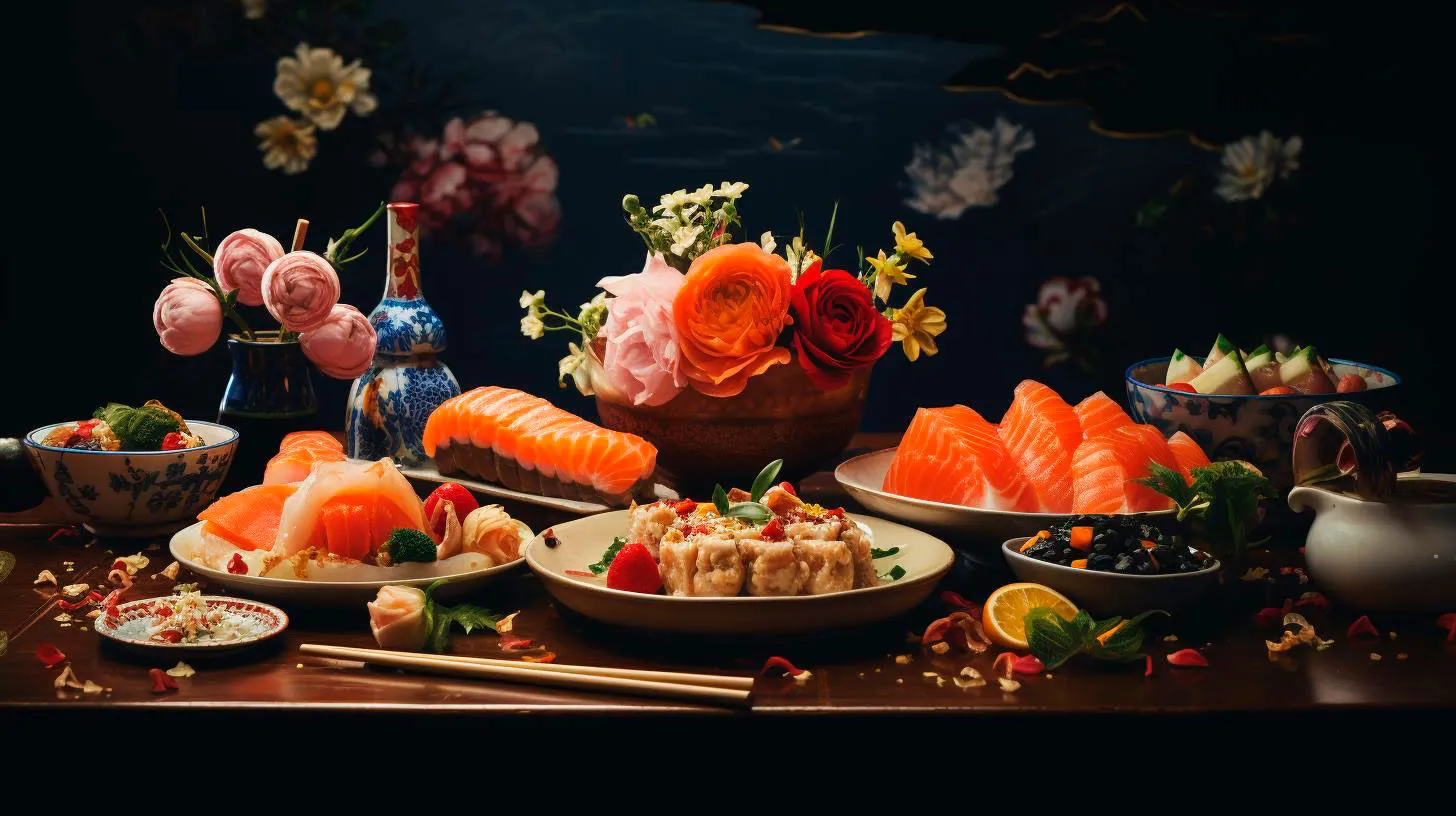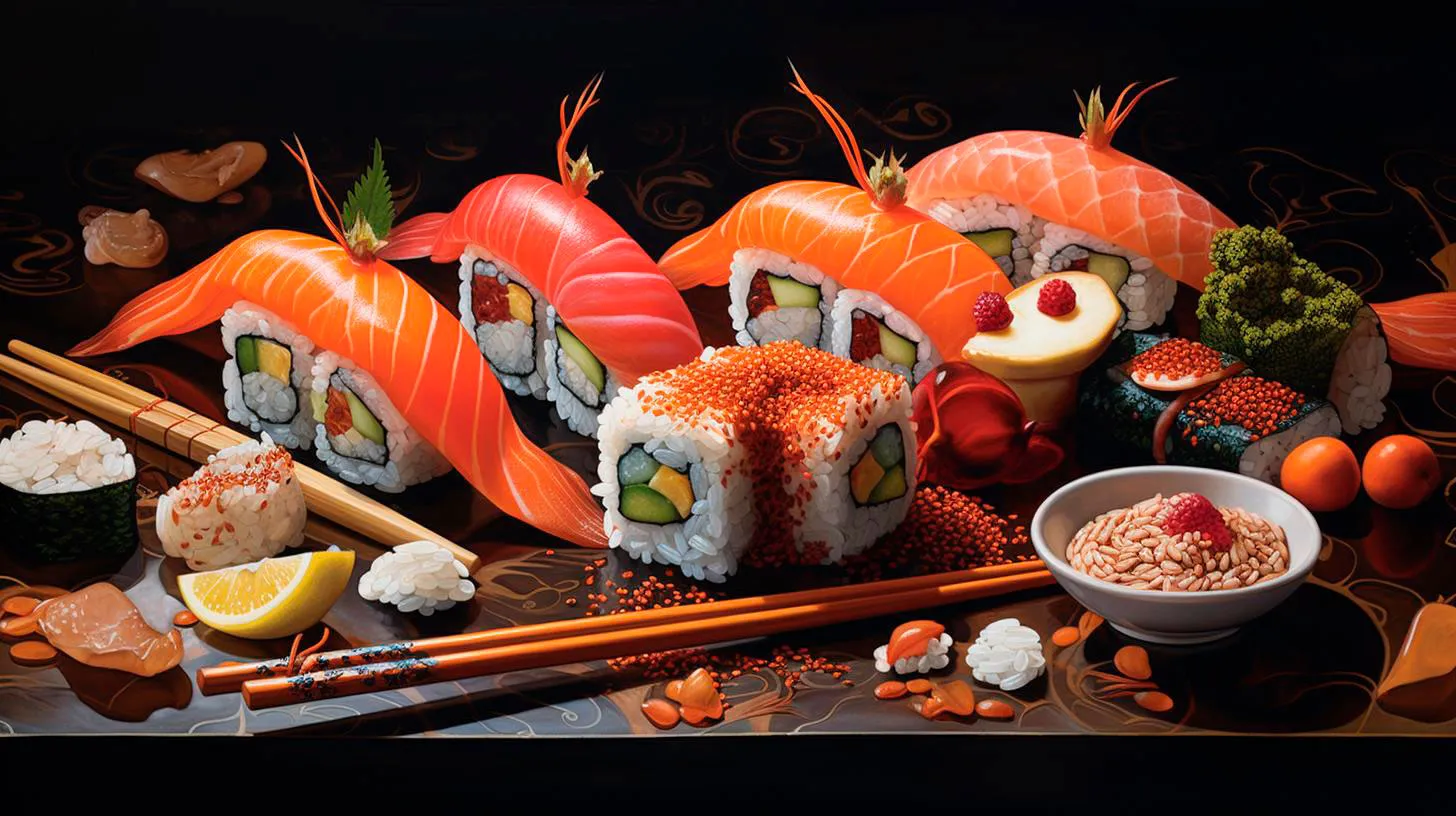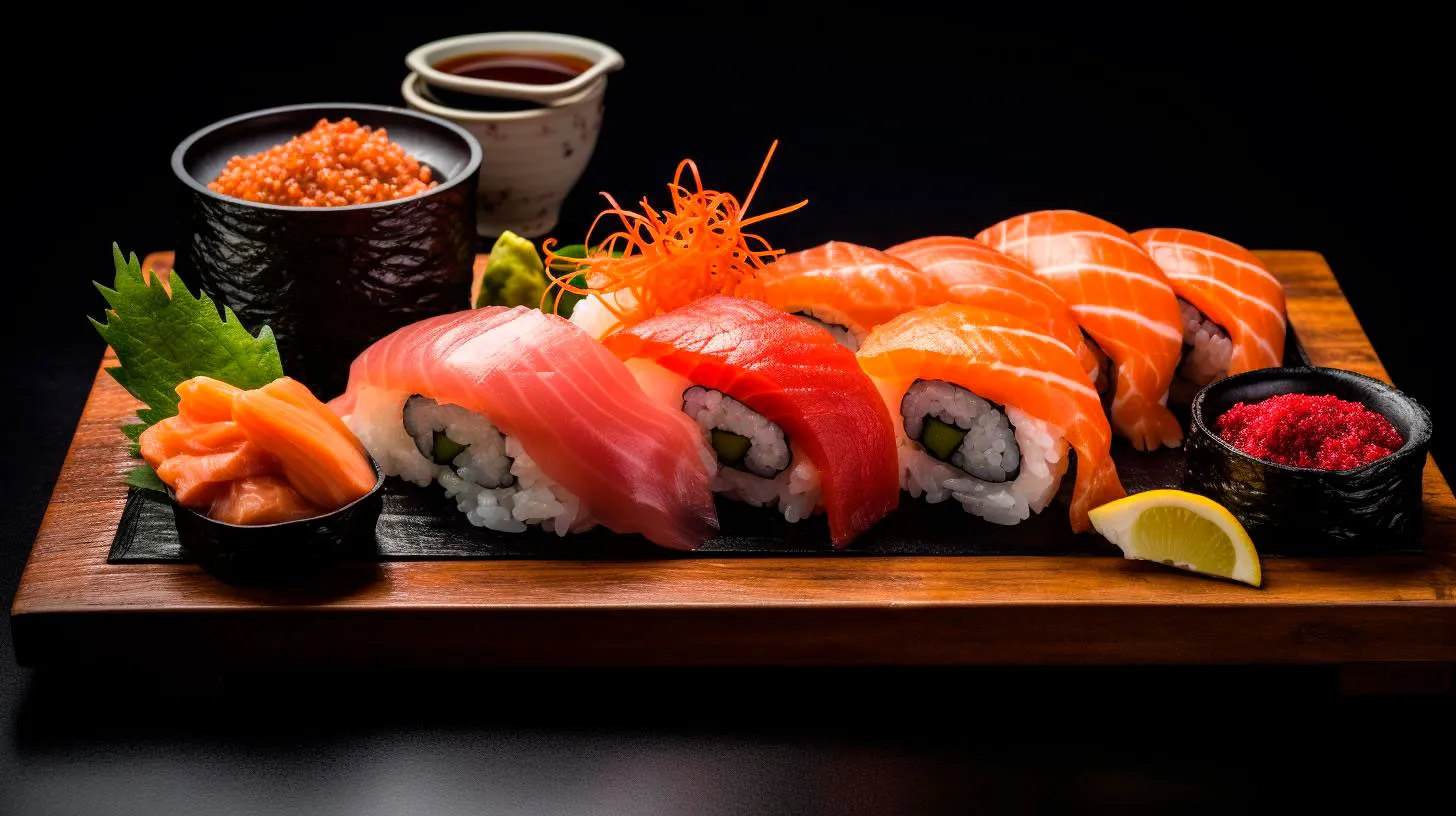Sushi: A Symbolic Culinary Art at Cultural Celebrations
In this article, we will explore the fascinating world of sushi and how it has become a symbol of artistry and tradition worldwide.
A Brief History of Sushi
Sushi originated in Southeast Asia over 2,000 years ago. Originally, it was a way of preserving fish by fermenting it with rice. In the 8th century, Japan adopted this preservation method and developed it into the sushi we know today. In the early years, sushi was exclusively consumed by Japanese nobility but eventually gained popularity among the masses. By the 19th century, sushi had become a staple in Japanese cuisine and started emerging globally, especially after the 1950s.
Today, sushi has evolved into an art form celebrated around the world. Its precise preparation techniques, focus on fresh ingredients, and delicate presentation contribute to its status as a culinary masterpiece. Sushi chefs, known as itamae, undergo years of training to perfect their craft, ensuring an exceptional dining experience for sushi aficionados worldwide.
The Symbolism of Sushi in Cultural Celebrations
Sushi has transcended beyond being a mere dish and has become an integral part of cultural celebrations. It is prominently featured in festivals, weddings, and other significant occasions. Let’s delve into the symbolic significance of sushi in these events:
1. Festivals:
- Sushi represents abundance and prosperity: These traits are associated with festivals, where communities come together to celebrate a bountiful harvest or commemorate significant events.
- Sushi reflects cultural diversity: In multicultural festivals, sushi showcases the blending of different culinary traditions, fostering unity and appreciation for various cultures.
- Sushi exemplifies craftsmanship: Festivals often feature sushi made by skilled itamae, adding a touch of artistry and showmanship to the celebrations.
2. Weddings:
- Sushi symbolizes good luck and happiness: Serving sushi at weddings is believed to bring luck and blessings to the newlyweds, ensuring a prosperous and joyous life together.
- Sushi embodies elegance and sophistication: The delicate and refined nature of sushi mirrors the elegance and grace expected in a wedding ceremony.
- Sushi promotes communal dining: Sharing sushi platters at wedding banquets fosters a sense of togetherness and strengthens family bonds.
The Global Impact of Sushi
Sushi has made its way into the hearts and stomachs of people worldwide. Its popularity has reached unprecedented levels, with sushi restaurants popping up in every corner of the globe. Here are some key takeaways that highlight the global impact of sushi:
1. Economic Growth:
- Sushi has become a billion-dollar industry: The global sushi market is projected to reach USD 22.5 billion by 2026, driven by increasing demand and consumer preferences for healthy and exotic cuisine.
- Job creation and tourism: The sushi industry generates employment opportunities and attracts tourists seeking authentic Japanese dining experiences.
- Influence on fish markets: The demand for sushi-grade fish has led to the growth of fish markets, benefitting local fishermen and the overall fishing industry.
2. Culinary Fusion:
- Sushi fusion: Sushi has embraced cultural adaptations in different countries, resulting in creative fusion dishes like California rolls, sushi burritos, and sushi pizza.
- Cultural exchange: The popularity of sushi has encouraged cultural exchange, enabling people from diverse backgrounds to appreciate and celebrate Japanese traditions.
In Conclusion
Sushi is not just a mouthwatering delicacy; it is a symbolic representation of Japan’s rich cultural heritage. From its humble beginnings as a preservation method to its status as a global culinary phenomenon, sushi continues to captivate the hearts and taste buds of people worldwide. Its presence at cultural celebrations signifies abundance, prosperity, and unity. Let us all savor the artistry and tradition that sushi brings to our plates and indulge in the culinary journey it takes us on.
The Symbolic Significance of Sushi in Festivals
In this article, we will dive into the symbolic significance of sushi in festivals, exploring its cultural significance and the deeper meanings behind this culinary delight.
Cultural Importance of Sushi
Sushi, the iconic Japanese dish that combines vinegared rice with various toppings, holds significant cultural importance in Japan. It has been a staple of Japanese cuisine for centuries and has evolved into many different styles and variations. Sushi is not just a meal; it’s an art form that represents the meticulous craftsmanship and attention to detail deeply rooted in Japanese culture.
- Sushi is often seen as a symbol of perfection and harmony due to the precision required in its preparation.
- It reflects the Japanese values of simplicity, purity, and respect for ingredients.
- Sushi is also known for its health benefits as it includes fresh, high-quality seafood, which is packed with essential nutrients.
- The act of enjoying sushi brings people together, fostering a sense of community and togetherness.
Sushi in Festivals
Japanese festivals, known as “matsuri,” play a significant role in the nation’s culture, and sushi often takes center stage during these celebrations. Here are some ways sushi is prominently featured in festivals:
Symbolic Offerings
During festivals, sushi is often offered as a symbolic gesture to deities or ancestral spirits in Shinto rituals. It is believed that by offering sushi, people can express their gratitude and seek blessings for a bountiful harvest, prosperity, and good fortune.
Food Stalls and Street Stalls
Festivals in Japan are famous for their vibrant food stalls, and sushi is a must-have item. Visitors can indulge in a wide variety of sushi rolls, nigiri, and sashimi, prepared fresh and served on the spot. These delectable treats not only satisfy hunger but also provide a sensory delight, enticing festival-goers with their enticing aromas and colorful presentation.
Traditional Sushi Types
Several traditional sushi types have special significance during festivals:
- Chirashizushi: A colorful and festive dish made with a variety of fish, vegetables, and other toppings scattered on a bed of seasoned rice. It represents abundance and good luck.
- Inarizushi: Sushi rice wrapped in a deep-fried tofu pouch, representing fertility and happiness.
- Oshizushi: Sushi rice and toppings pressed together and sliced into bite-sized pieces. It symbolizes unity and togetherness.
Key Takeaways
Understanding the symbolic significance of sushi in festivals offers fascinating insights into Japanese culture and traditions. Here are the key takeaways:
- Sushi represents perfection, harmony, and attention to detail.
- It embodies simplicity, purity, and respect for ingredients.
- Sushi is not just a meal but an art form that reflects Japanese craftsmanship.
- Enjoying sushi fosters a sense of community and togetherness.
- Sushi is offered as a symbolic gesture during festivals to seek blessings and express gratitude.
- Traditional sushi types like Chirashizushi, Inarizushi, and Oshizushi hold deeper meanings and are celebrated during festivals.
Next time you indulge in a delicious sushi roll, remember the symbolic significance it holds not just as a culinary delight, but as an integral part of Japanese festivals and culture.
Exploring the Cultural Symbolism of Sushi in Festivals
In this article, we will delve into the significance of sushi in festivals, exploring its rich symbolism and the role it plays in traditional celebrations.
The Significance of Sushi in Festivals
1. Celebration of Harvest: Many festivals in Japan are deeply rooted in ancient agrarian traditions, marking the harvest season. Sushi is often served during these festivals as a representation of abundance and gratitude for the bountiful harvest.
2. Symbol of Good Luck: Sushi, particularly maki rolls, are prepared with ingredients that are believed to bring good luck and fortune. For example, the red color of tuna symbolizes good fortune, while the maki roll’s cylindrical shape represents the wish for continuous prosperity.
3. Offering to Deities: In religious festivals, sushi is offered as a form of culinary tribute to deities and ancestors. It is considered an auspicious offering that symbolizes reverence and respect for the spiritual entities.
The Cultural Symbolism in Different Types of Sushi
Nigiri Sushi
Nigiri sushi, the iconic hand-pressed sushi, holds symbolic connotations as well.
- The shape of nigiri sushi resembling a small boat signifies a wish for a safe journey, both in physical and spiritual aspects.
- The harmony between the fish and rice represents the balance in life and the interconnection between humans and nature.
Maki Sushi
Maki sushi, also known as rolled sushi, carries its own cultural symbolism.
- The circular shape of maki rolls symbolizes the continuity of life and the hope for everlasting happiness.
- The use of colorful ingredients and decorative patterns in maki rolls reflects the mentality of finding joy in the beauty of nature.
Sushi Festivals: Embracing Tradition and Culinary Delights
Japan is home to many sushi festivals that celebrate the art of sushi-making and the cultural significance it holds.
1. Sushi Tsunoda Festival: Held annually in Tsunoda, this festival showcases the art of sushi-making and allows visitors to try various types of sushi while learning about its cultural context.
2. Shizuoka Sushi Festival: Located in Shizuoka, this festival not only offers a wide range of sushi but also provides visitors with educational workshops and sushi-making classes to learn about the tradition firsthand.
Key Takeaways
Sushi, beyond being a delicious dish, carries immense cultural symbolism in Japanese festivals:
- It represents abundance and gratitude for the harvest.
- It symbolizes good luck and fortune through its ingredients and shapes.
- Sushi is offered as a divine tribute to deities.
Whether you have an appreciation for Japanese culture or simply enjoy sushi, understanding the cultural symbolism behind this culinary delight adds an extra layer of enjoyment to your dining experience. So, next time you indulge in sushi, take a moment to appreciate the depth of tradition and symbolism it embodies.



